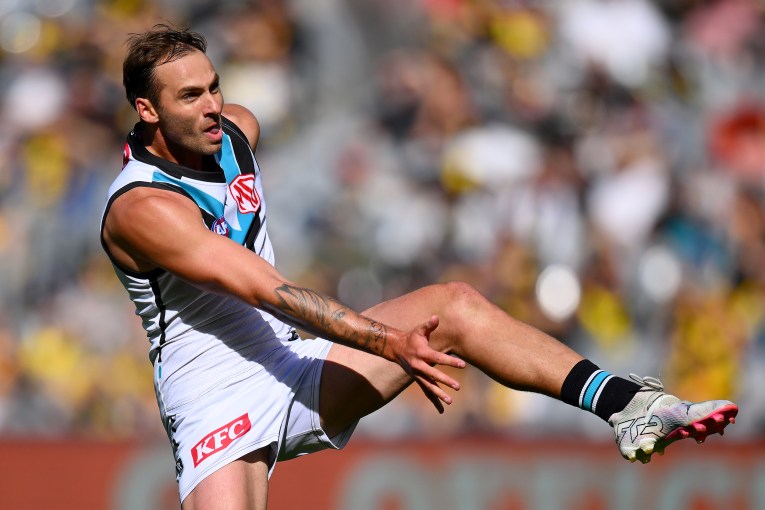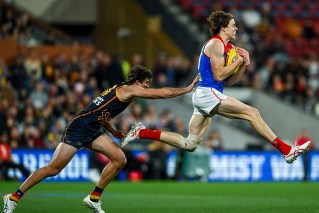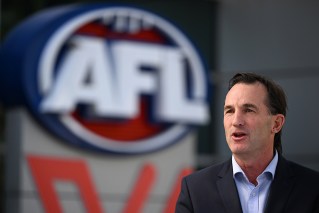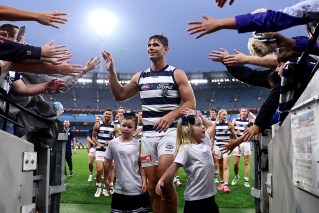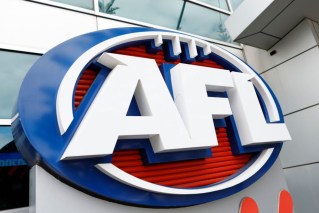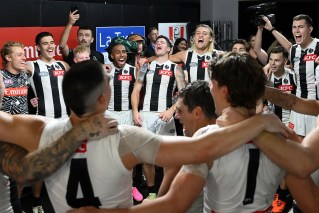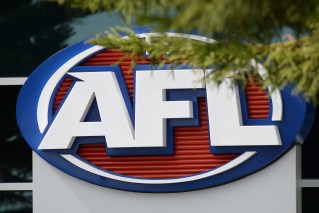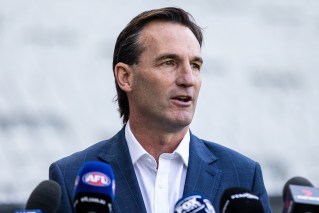Gary snr or jnr? Tim or Jobe? Father-son verdicts

SONS OF GUNS: THE GENESIS
The AFL’s father-son rule was introduced more than 60 years ago to bring back some romance into football by ensuring the bloodlines of champion players – the fan favourites – remained at the same club. Dynasties would flourish as club legends begat new generations of boy wonders.
Fittingly, it was Ron Barassi, who’d go on to become one of the code’s greatest players, who indirectly brought about the rule’s introduction.

Ron Barassi jnr helped deliver Melbourne extraordinary success. Photo: Getty
Barassi’s father, Ron snr, played 58 games for Melbourne before signing up for the Army in 1940. He was killed less than a year later, on active service at Tobruk, the first VFL footballer to lose his life in World War II.
Ron jnr was five at the time and ended up retaining a strong link with the Demons through his childhood. The trouble was, he was zoned to Carlton, so the Demons lobbied to get a new father-son rule introduced.
Mercifully for them, they were successful: ‘Barass’ would go on to play in the six premierships Melbourne won between 1955 and 1964, and forge his reputation as a fearsome competitor which would later become a trademark of his coaching career.
So the father-son rule is one that’s met with almost universal support. After all, which Essendon supporter doesn’t want to see reincarnated versions of Ken Fletcher and Timmy Watson running around in the red and black? Which Tigers’ fan could face seeing Matthew Richardson in colours other than those worn by his dad, ‘Bull’?
Likewise Stephen Silvagni, the AFL’s fullback of the century who was known universally as SOS – Son of Sergio – after his father, the bandy-legged Carlton legend of the 1960s. Lygon St would have revolted had he ended up in a guernsey that was any other colour than navy blue.
At the weekend, the father-son rule produced another success – for Geelong anyway – when Jed Bews, the son of former Cats captain Andrew, stepped out for his AFL debut, against Fremantle in Perth.
SONS OF GUNS: THE WINNERS
The Cats, more than any other club, have been huge beneficiaries of the rule, having been represented in recent years by, among others, Gary Ablett, Matthew Scarlett and Tom Hawkins.
While the league’s motives in introducing the rule were well meaning, by some quirk of fate it seems to have had the effect of favouring the strong and wealthy clubs while doing little to help the small and impoverished.

Jonathan Brown helped deliver three flags for Brisbane. Photo: Getty
Who could have imagined, for example, that Ken Fletcher and John Scarlett would sire two sons with 649 games and five premierships between them?
Jobe Watson and Dustin Fletcher remain mainstays of the 2014 Essendon outfit, for example, while Joe Daniher seems destined for great things. Meanwhile, Travis Cloke (and until recently Heath Shaw) at Collingwood, Jarrad Waite at Carlton and Hawkins at Geelong continue dynasties at their particular powerhouse clubs.
In fact, there’s a strong argument to say the rule has sometimes meant the difference between them winning premierships and being also-rans.
Does anyone seriously imagine Geelong would have won its last three premierships without Matthew Scarlett, the premier fullback of his era, and Gary Ablett (for two of the three, anyway)? Scarlett, of course, was responsible for the critical toe-poke that ended up in Ablett’s arms in the dying moments of the 2009 GF. Would the Cats have prevailed over Collingwood in 2011 without Tom Hawkins who almost single-handedly carried them over the line following James Podsiadly’s injury?
And how pivotal were Cloke and Shaw – highlighted by his game-turning goal square smother of Nick Riewoldt – in the Pies’ grand final win in 2010?
And Jonathan Brown (son of Fitzroy’s Brian) in Brisbane’s three-peat from 2001? And Ashley McIntosh, playing at fullback on Bill Brownless and Gary Ablett, in 1992 and 1994: how important was he to West Coast’s campaigns? And the list goes on.
SONS OF GUNS: THE LOSERS
At the other end of the spectrum, Adelaide, North Melbourne, Melbourne and Hawthorn bring up the foot of the ladder. They’re the teams that have, until now, enjoyed almost zero benefit from the policy (although no-one will feel too much sympathy for the Hawks after their decision to offload Josh Kennedy to Sydney a few years ago.)
But now the worm is turning and the league’s perennial battlers look, finally, like sharing in the father-son bounty.
Jack Viney is just the kind of rugged, no-nonsense midfielder that Melbourne has craved for years. And following another stellar performance in the Dees’ upset win over Richmond on Saturday, he looks set to become a key part of Melbourne’s set-up for quite some time.
The Kangaroos picked up Luke McDonald, the son of former key position player, Donald, at No.8 in the last year’s national draft. It was the highest price yet (in terms of draft selection number) for a father-son recruit but the Roos were happy to pay it for they appear to have a ready made half-back on their hands.
And the Western Bulldogs are set to reap massive rewards from the rule in coming years as Tom Liberatore – and Mitch Wallis, Ayce Cordy and Lachie Hunter – continue to make their presence felt in the game.
SONS OF GUNS: THE VERDICTS

Gary jnr, by a whisker. Photo: Getty
Gary Ablett snr v Gary Ablett jnr
Why not start off with an easy one? Sheesh. OK, on the dad’s side, we have this to consider: a berth in the AFL’s Team of the Century, three Coleman Medals, eight All-Australian selections, 1030 career goals (the fifth highest in history, despite having spent only four seasons as a full-time spearhead), a record nine goals in the 1989 Grand Final, and a highlight reel unlike any other in terms of freakish individual brilliance.
But then along came his boy, Gary jnr, smaller and balder, who has gone on to win two premierships, the small matter of two Brownlow Medals, five AFLPA MVP awards, seven All-Australian selections, two Geelong B&Fs (in premiership years, no less) and three club champion awards at Gold Coast, where he is captain.
The verdict: On the matter of individual brilliance, the old man has it all over his son. But when leadership, team play, selflessness and consistency of output are considered, it is jnr, by a whisker.

Tim … for now. Photo: Getty
Tim Watson v Jobe Watson
Again, the old man has it all over his boy in terms of flair and producing the spectacular. He also might have set more hearts aflutter on the Windy Hill terraces, his name, and No.32, adorning more Bomber duffel coats than Jobe’s ever would.
But when we take into account the complete package – much like in the preceding Ablett debate – it is harder to split the pair. Tim played 307 games with Essendon, was a key member of three premiership teams and a four-time best-and-fairest winner. He also led the club for three seasons.
Jobe has not yet won a premiership, nor has he played 200 games, but in his own quiet, low-key way has compiled a wonderful CV, including a Brownlow Medal, two All-Australian selections, three Best and Fairest awards, five years as captain, and was the winner of the AFLPA Best Captain Award in 2012.
The verdict: So, it’s Tim for us – just – at the moment, but we won’t be at all surprised if he’s trumped by Jobe sometime soon.

Tony Liberatore’s record speaks for itself. Photo: Getty
Tony Liberatore v Tom Liberatore
Tom’s only played 63 games for the Western Bulldogs yet some are venturing the opinion that he’s ready to surpass his Dad’s achievements.
What a load of old tosh. Libba snr might have been a slow, stumpy, skill-challenged footballer, but boy what a great competitor he was.
‘Libba’ was at the forefront of the Bulldogs’ success in the 1990s, and he got there on the back of pure grit.
And he wasn’t just a one-paced plodder either, as his victories in the Morrish, Gardiner and Brownlow Medals would attest.
Young Libba has undoubtedly made a scorching start to his career and may overhaul his old man’s achievements in time.
The verdict: For now, we’re sticking with the feisty No.39 who came to be living proof of the league’s boast that Australian football was a game for everyone, no matter their stature or athleticism.
Sergio Silvagni v Stephen Silvagni
The verdict: Sorry Serge, but this one’s a no-brainer. You might have played 239 very serviceable games with Carlton and won premierships, in 1968 and 1970, but that has been trumped by your son’s glittering achievements: 312 games, two premierships, five times All-Australian and a berth in the AFL Team of the Century.
Ken Fletcher v Dustin Fletcher
The verdict: Again, dad in this instance has been usurped by a rather remarkable son. Ken’s 264 games with Essendon and club best and fairest award in 1978 – worthy thought they are – pale alongside Dustin’s extraordinary career which has been marked by longevity (386 games, and counting, over 21 years) and success (two premierships, two All-Australian berths and a best-and-fairest award.)
Jack Hawkins v Tom Hawkins

Tom has easily outshone dad. Photo: Getty
‘Jumping Jack’ was a high-flying backman who played 182 games for the Cats in their not-very successful era of the 1970s. He was eye catching but some way short of being a champion.
His son, Tom, while still a flakey kick for goal, has forged a career as one of the elite key forwards in the game – and is a two-time premiership player. Indeed, he should have been awarded the Norm Smith Medal in the 2011 GF for his outstanding lone-hand display up forward. Tom continues to produce his best in the big games, a fact acknowledged by his coach, Chris Scott, earlier this season.
The verdict: Sorry, Jack, but your boy’s got the nod … comfortably.

Travis, the best of the Cloke boys. Photo: Getty
David Cloke v Travis Cloke
David, he of the Zapata moustache, played 333 games in a much under-rated career with Richmond and Collingwood. Teammates such as Kevin Bartlett, though, are often at pains to point out just what a good player Cloke was. He won VFL Premierships with Richmond in 1974 and 1980, and All-Australian honours in 1979, and was a strong physical presence wherever he played.
His son, Big Trav, is one of three Cloke boys to make the grade as an AFL player. He’s clearly the best, though, being a mainstay of the Collingwood forward line with his strength and contested marking ability for the past seven or eight years.
Trav has played 205 games, helped the Pies to the 2010 Premiership, won the Copeland Trophy in 2007, and has twice been selected in the All-Australian team. Dad’s got the longevity; son’s got a couple more baubles.
The verdict: The Cloke v Cloke clash is a close-run thing. We’ve fed all the relevant data into The New Daily computer, waited for it to whir and rumble … and eventually spit out a verdict. And the winner is: a tie … we can’t split them in a photo finish.
(A player qualifies for the father-son rule, and can nominate which AFL clubs he joins, if his father played more than 100 games with that club. The cut-off previously was 50 games, but increased a decade ago.)
